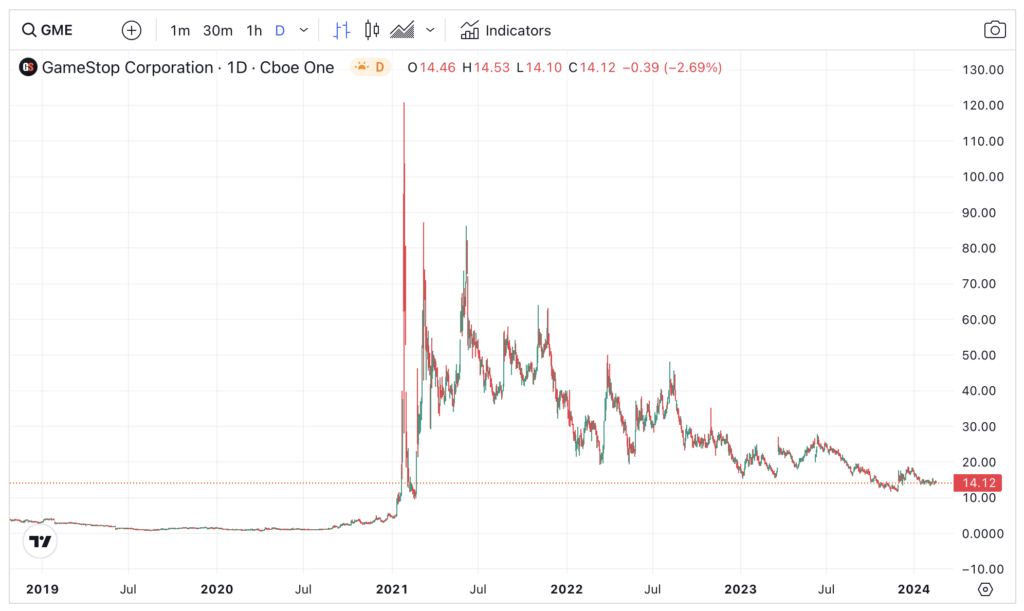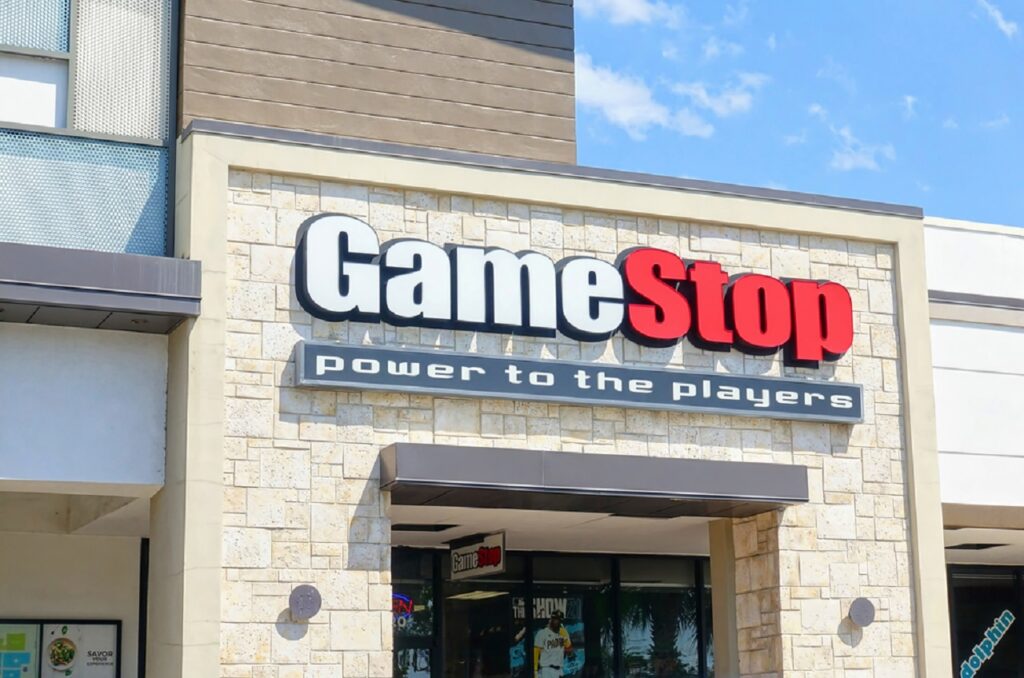Every now and then, a trading frenzy grips Wall Street. These dramatic episodes of sudden manic buying, and selling, often pepper the storied history of financial markets. But what actually happened to the GameStop (GME) stock price?
The GameStop Saga
A little over three years ago, the ailing video-gaming retailer became one of the most traded shares in the world. So intriguing was this episode that it morphed into several documentaries and a Hollywood film last year, aptly named Dumb Money – starring Paul Dano and Sharlene Woodley.
Basically, Gamestop was a highly-shorted retailer that was on the verge of folding when, during the unprecedented 2020 pandemic, a group of bored retail investors bought heavily. Most of the time, retail investors lose money due to ill trading discipline and information asymmetry. Unsurprisingly, they are known as ‘Dumb Money’. Not this time.
As GameStop’s share price started its stratospheric climb, hedge funds (aka the ‘Smart Money’) needed to close their fast-losing short positions. This fuels even more buying, as now everyone notices that these shorters need shares to buy. At one point, Melvin Capital (now defunct) was losing $1 billion every 24 hours.
One good thing about capitalism is that whenever there is spilt blood, sharks immediately pounce on it. Greasing the GameStop speculation were the low-cost brokers like Robinhood (HOOD), which attracted retail punters with near-zero commissions, and the global information network (eg Reddit’s r/WallStreetBets), which shaped and amplified the bullish case for GameStop.
Suddenly, buying GameStop became a social phenomenon. As long as GameStop shares continued their ballistic, upward-only action, it created a ‘feel good’ mantra of we (the small guys) against those ‘greedy hedgies’ (eg Melvin Capital). For a few crazy sessions, GameStop became the most-traded stock in the US.

Source: MarketWatch (2021)
Of course, manias like this couldn’t last, and it didn’t. Due to unprecedented volatility, Robinhood restricted new buying of GameStop shares, to howls of wild protests. Then, the buying pressure tapered off. Prices crashed shortly after and erased much of Gaestop’s recent gains.
What can we learn from the GameStop saga?
Looking back, what have we all learned from the GameStop saga? Three lessons stood out.
One, when conditions are ripe, a systemic event – however unexpected – can happen. We saw that with the 2011 Arab Spring and the 2020 covid pandemic. In the case of GME, an array of social media speculation triggered vast demand for the hugely-shorted stock. GameStop’s share price surged to unbelievable levels. Unexpected – yet it happened.
Two, timing matters. To join a wild stock party you really have to arrive early. Too late in, and you will be nursing heavy losses on the way down. Many of those Johny-come-lately became ‘bag holders’. Do not confuse a short-term trading opportunity with a long-term investing case.
Three, when a stock mania is already well publicised, widely followed, and has already generated inflated stock gains approaching 500-1,000 percent, it really is a good idea to take whatever profits you have and jump. Oh, and don’t look back.
Occasionally, those who bought near the GME peak would have had a second chance to exit at a minor loss. Which they should have grabbed. Holding on for dear life (HODL) in a bubble is highly dangerous financially as stock prices can go down 95 per cent easily.
For GME, its share price lost 90 percent of its value in a matter of days. Those GME long position holders who failed to take advantage of the massive rebound in March and September 2021 to get out are now suffering a drawdown close to 80 percent these days. Even the director of Dumb Money Craig Gillespie lost money betting on Gamestop.

Will we see a repeat of GameStop mania in 2024?
I doubt it. The GameStop saga happened because of a set of unique factors back in 2021. Much has changed since Keith Gill aka Roaring Kitty pumped GME.
The oceans of retail liquidity fuelled by easy money have subsided significantly. High inflation and interest rates sapped buying interest. GME is no longer hugely shorted. And more importantly, the post-pandemic stock booms are restricted as the global monetary quantitative easing turned to quantitative tightening.
Still, we continued to see pockets of massive stock rallies as investors and retail buying squeezed into high-flying stocks like Abercrombie and Fitch (ANF) or Nvidia (NVDA). But again these super-bull runs are vulnerable simply because most people have already bought into them.
If there is one thing the movie Dumb Money taught us is this: One has to prepare for stock booms like Keith Gill. He was in GameStop long before the boom started. He did his homework and knew GameStop’s underlying value. He then positioned carefully and waited patiently for the perfect time to harvest. Albeit with the true force of social media behind him.
If history is any guide, the next GameStop-like mania is likely to happen in the most unlikely places.

Jackson is a core part of the editorial team at GoodMoneyGuide.com.
With over 15 years of industry experience as a financial analyst, he brings a wealth of knowledge and expertise to our content and readers.
Previously, Jackson was the director of Stockcube Research as Head of Investors Intelligence. This pivotal role involved providing market timing advice and research to some of the world’s largest institutions and hedge funds.
Jackson brings a huge amount of expertise in areas as diverse as global macroeconomic investment strategy, statistical backtesting, asset allocation, and cross-asset research.
Jackson has a PhD in Finance from Durham University and has authored over 200 guides for GoodMoneyGuide.com.
To contact Jackson, please see his Invesdaq profile.



